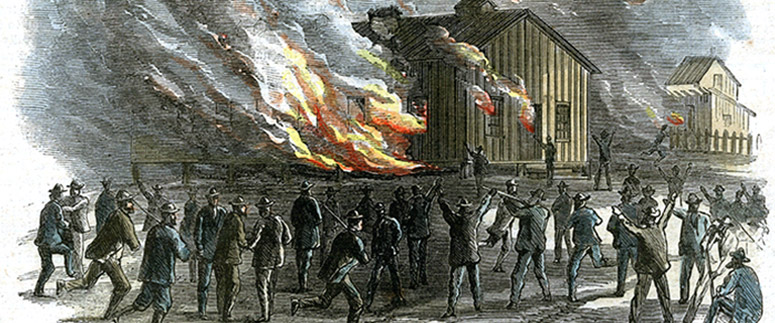THE NATION CLASSROOM
American History as It Happened
RACE RELATIONS and CIVIL RIGHTS
MODULE ONE: 1865–1877
DBQ: Explain why Reconstruction was such a complex, difficult task for the federal government after the Civil War ended.
|
DOCUMENT ONE Source: “The South as It Is,” by Our Special Correspondent, The Nation, July 20, 1865 Lynchburg, Virginia |
|
DOCUMENT TWO Source: “What the South Needs First” (unsigned article), The Nation, January 18, 1866 If we want peace at the South, and permanent peace, we must in some way or other first of all familiarize the mass of the people with the idea of law as an irresistible power to which all must bow, and which throws just the same amount of protection over the meanest as well as the proudest black or white. If this can only be done by force, force we must have to do it, and, until this is done, the first step has still to be made in the re-organization of Southern society. Whatever military force may be necessary to afford to every freeman, of whatever color, the protection which the Constitution guarantees him, in person and property, we must maintain, and in doing so we shall be carrying out the true democratic theory of government. |
|
DOCUMENT THREE Source: “Education in the Late Rebel States” (unsigned article), The Nation, March 22, 1866 The spirit of the great question of reconstruction is, when divested of all side issues, simply this: Will “the South,” when re-admitted, be true to the Union, and will the Union men and negroes residing in the rebellious States be allowed to remain undisturbed in their rights as citizens? Passing over the promises of loyalty from people whose most frequent utterances at present, whether in the press, on the rostrum, or from the pulpit, are thinly disguised threats to renew rebellion, we would direct observation to the vigorous and apparently well-organized efforts made in the Southern States to prevent the blacks from exercising their civil rights, by hindering them from learning to read. |
|
DOCUMENT FOUR Source: “The Moral of the Memphis Riots” (unsigned article), The Nation, May 15, 1866 Anybody who expects Southern whites and blacks to settle down into their true and just relations to each other without breaking one another’s heads a good deal, knows little either of history or human nature. There will prevail at the South for a long time to come a great deal of envy, hatred, and malice towards the colored population and they will show themselves in riots and outrages more or less flagrant. What was peculiar about the Memphis riot was that the officers of the law, the very persons on whom the colored population will have to rely for protection as soon as the troops are withdrawn, took a leading part in it, and we have very little doubt that were any similar outburst of popular prejudice to take place to-morrow in any other town in the South, the local police, if they interfered at all, would interfere in the same way. |
|
DOCUMENT FIVE Section 1: The right of citizens of the United States to vote shall not be denied or abridged by the United States or by any State on account of race, color, or previous condition of servitude. Section 2: The Congress shall have power to enforce this article by appropriate legislation. |
|
DOCUMENT SIX Source: “The End at Last” (unsigned article), The Nation, May 19, 1870 There are two bills now before Congress which, if the Reconstruction process be capable of completion, ought to complete it. One provides for the execution of the Fifteenth Amendment, by forbidding under the sanction of appropriate penalties, all attempts, direct or indirect and either of omission or commission, to prevent colored persons entitled to the franchise from exercising it. Another, introduced by [Senator Charles] Sumner, provides for the admission of colored persons on equal terms to all hotels, public conveyances, licensed theatres and places of public amusement, and public institutions; and he admits that, if this be passed, there will be nothing left undone that legislation can do to improve the condition of the colored man. We hope they will both be passed without any unnecessary delay. There are so many ways of cheating people out of their votes, and there are so many voters whom it is easy to cheat, that we may be sure, in a large number of places, negroes would, by one trick or other, be robbed of their share in elections, no matter how solemnly guaranteed to them by the Constitution, unless the various modes of defrauding them were enumerated, punishment prescribed for each, and the exact mode of getting it inflicted pointed out. |
|
DOCUMENT SEVEN Source: “The Week” (unsigned article), The Nation, August 3, 1871 It is understood that the sub-committee appointed by the Congressional committee which was ordered to investigate the affairs of Ku-Klux Klan in the South are going to report…that there is such a thing as the Klan in existence; that it does attack people for their politics; is composed of “Conservatives,” and contains no Republicans; has committed many most bloody and hateful outrages… |

